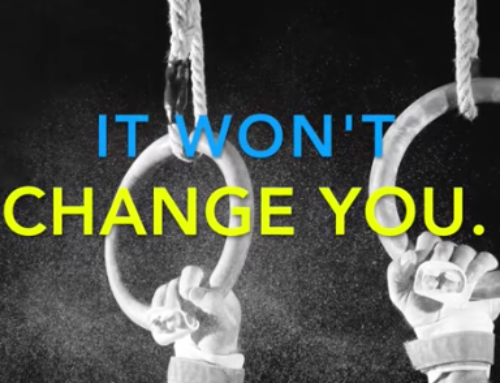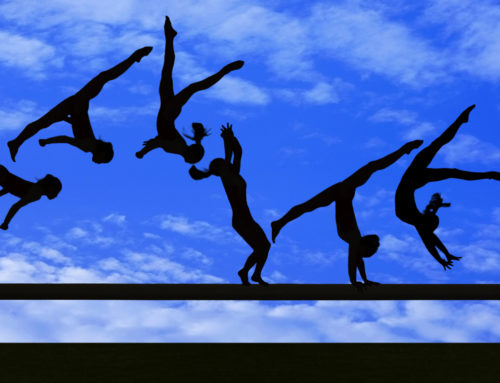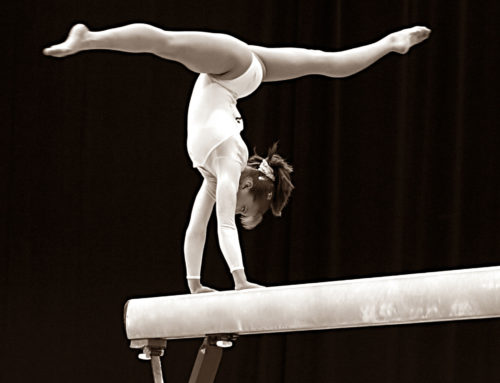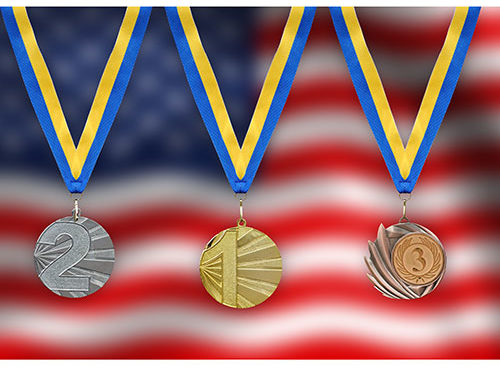I remember back when I was training, I ran in to a major issue with a skill that I had already acquired and was performing well. It was a dismount off parallel bars that was fairly simple for me. One day during practice, I was just slightly off on it and hit the bar pretty hard.
No big deal. I figured I would just jump there quickly and do it again. Well, I did…and hit the bar again…harder. At this point fear had set in and all of a sudden I no longer had the skill. I literally couldn’t do it. I knew my body was capable of doing it, but my mind wouldn’t allow it.
It was the dreaded mental block.
It happens to everyone, and can really have a detrimental effect on performance and confidence. Dr. Cohn provides us with some simple techniques and strategies to help overcome this.
– Brad Thornton
Written by Dr. Patrick Cohn
Many athletes that do one-on-one mental coaching with me are plagued by mental blocks…
They underperform based on skills shown in practice.
Is there a skill you perform consistently in practice but can’t do well in competitions?
A gymnast may fall off an apparatus during a routine that he normally performs flawlessly over and over in practice…
At the next competition, he may experience images of his previous fall coupled with an intense sense of fear…
He may see himself reenacting the same mistake, over-analyze on technique, tense up… and fall again!
Each fall tends to reinforce the idea that he cannot perform this skill successfully in competition.
Can you hurdle a mental block when you approach it with a physical change?
First, let’s define a mental block. A mental block is a mental game obstacle that prevents you from performing a particular skill in competition.
How does a mental block develop? Sometimes, one bad experience attempting a particular skill can lead to a mental block.
When you mess up a well learned skill in competition, some athletes then have a tendency to over-think the skill in future competitions or under similar athletic circumstances.
When you are performing at your peak, you can perform those same skills intuitively. You don’t overloading yourself with detailed information and directions on how to perform the skill.
How can you overcome a mental block?
Well, the answer is easy but the application can be difficult… Let go of over-generalizations and avoid over-thinking the skill.
Is it possible to not think about performing a particular skill?
Sure it is! Let’s see an everyday example… think of some habit that you perform unconsciously, like riding a bike…
When you first learned to ride, you were a bundle of nerves and it took a lot of conscious thought and effort…
The more you rode your bike, the more you learned how to balance, move forward, brake and probably ride with no hands. Now you ride can with no conscious thought at all…
The more experience you gain from performing a skill, the more automatic it becomes…
Even if you crash your bike, you most likely pick yourself up and continue on.
It is anxiety and fear that interfere with learned skills…
By consciously thinking about how to perform a skill, you move away from habit where you perform most efficiently. Just like when you consciously thought of riding your bike, you become shaky and fearful.
The answer is to trust the habits you have developed through repetition in practice, instead of trying to solve the problem by thinking your way through it–or trying to be perfect with it.
Try these strategies to hurdle mental blocks in competitions:
Tip #1: You should recall and rehearse all your successful attempts at performing the skill prior to competition. This will help increase your confidence for the start of the competition.
Tip #2: You should learn how to refocus. When you notice your thoughts drifting to past mistakes, take a deep breath and get out of your head by focusing on an object in the arena (ex. banners hanging from the rafters) or feeling a successful attempt. This will help to interrupt the distracting thoughts.
Your Mental Coach.
Dr. Patrick Cohn
P.S. Personal mental coaching is the best option for improving your mental toughness in sports. However, The Focused Athlete CD and Workbook Program is the next best thing to personal coaching.






I loved up to you will receive performed proper here.
The comic strip is attractive, your authored subject matter stylish.
nevertheless, you command get bought an nervousness over that you would like be delivering the following.
in poor health definitely come further in the past once more since exactly
the similar just about very steadily inside of case you defend this increase.
I conceive you have observed some very interesting details, appreciate
it for the post.
Hi there! Someone in my Myspace group shared this website with us so I came to give it a look.
I’m definitely enjoying the information. I’m book-marking and will be tweeting this to my followers!
Outstanding blog and brilliant design and style.